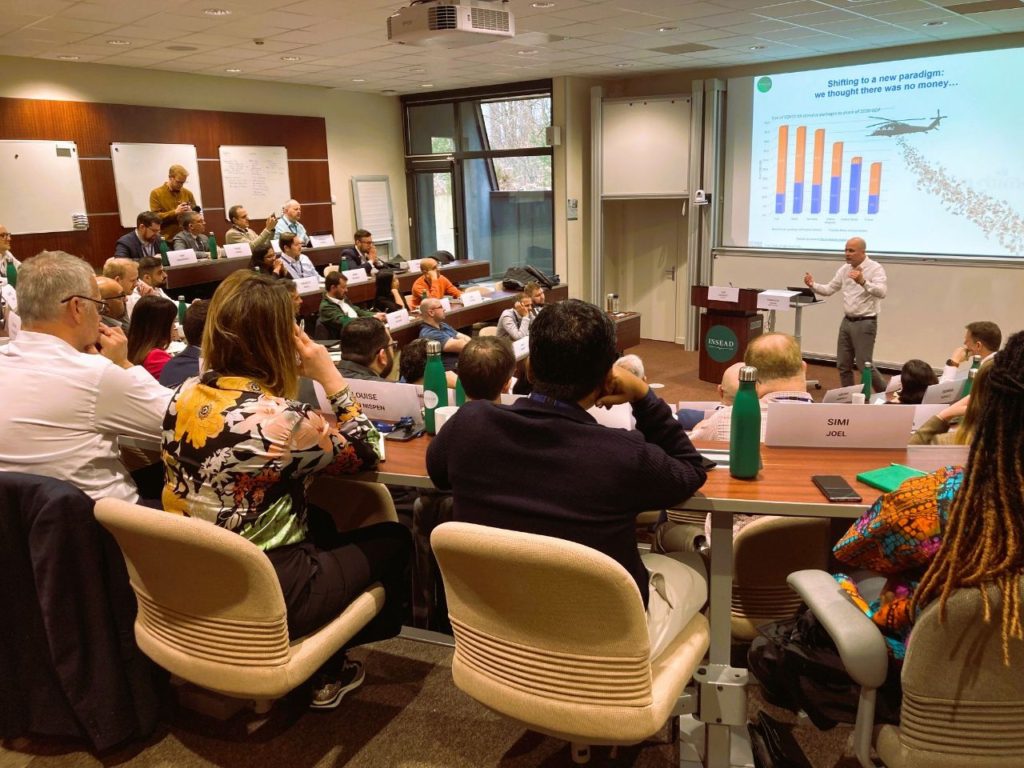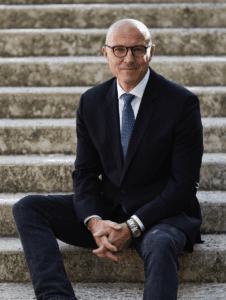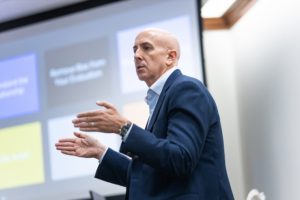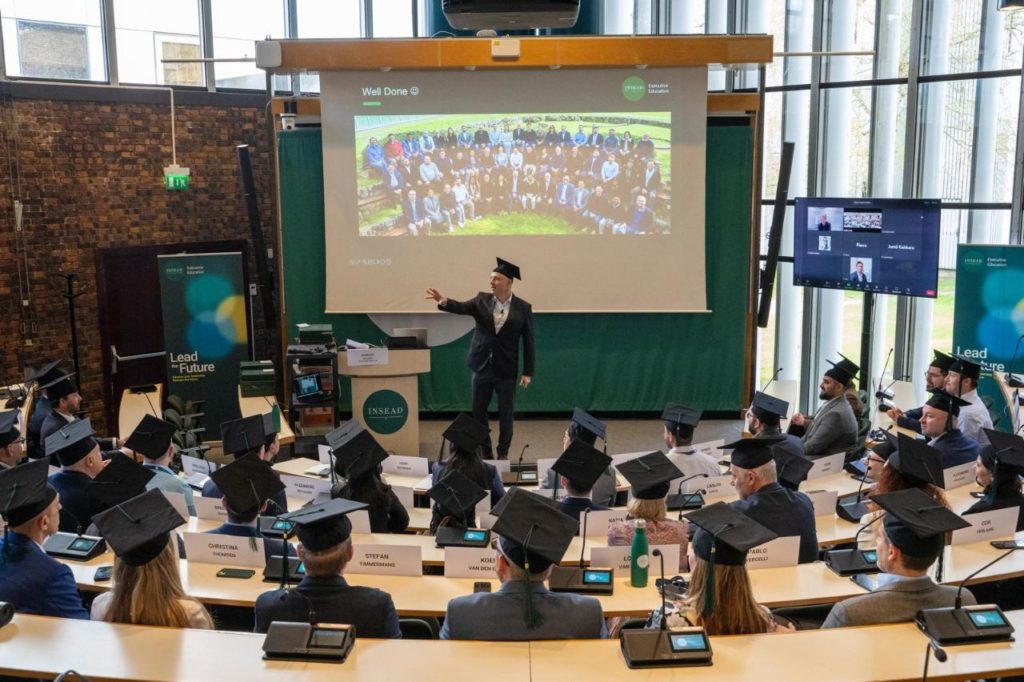
Charles Galunic teaches the Lead the Future class at INSEAD, one of dozens of elite executive leadership courses at the top global business schools
On the last day of Michelle Buck’s week-long executive education class on leadership at the Kellogg School of Management at Northwestern University, she asks her students to do a written exercise called “Who Am I as a Leader.” This seemingly simple exercise, usually just a paragraph long, she says, becomes a powerful tool because it helps them reflect on core values: who they are, where they come from, where they are headed, and what they offer as a leader.
Once they’ve returned to their workplace, the students — many of whom are at a “career inflection point,” meaning they have just started in a new leadership position — can use what they’ve written as a roadmap, says Buck, who is co-director of The Leader Within at Kellogg and one of the faculty members who teaches the course. She says former students tell her they refer to it frequently before they make a big decision or launch an important new project — some even keeping it close by in a desk drawer at work.
“In order to lead other people effectively, you’ve got to start with knowing yourself and being able to lead yourself,” says Buck, a clinical professor of leadership at Kellogg. “This practice of self-reflection and self-awareness gives them a kind of clarity and grounding, a kind of stability for them in the midst of a world of constant change.”
NEED FOR MORE LEADERSHIP COURSES POST-COVID

Northwestern Kellogg’s Michelle L. Buck teaches a class called The Leader Within: “There’s certain things going on in the world right now that are leading to us seeing an even stronger interest in leadership education and leadership programs”
Leadership classes like the one Buck teaches have proliferated at business schools in recent years, becoming one of the sought-after executive education subjects for rising executives starting — or in the middle of — their leadership journey. Post-covid these classes have become even more popular, with new year-long certificate programs on the topic on offer at schools like INSEAD and MIT Sloan School of Management, giving students a chance to delve into the topic in a more in-depth way, professors at leading business schools says.
Business schools have responded robustly to marketplace demand, with some developing as many as a dozen or more classes in the subject. Kellogg has 20 executive leadership and development programs listed on its website, including The Leader Within class, while Stanford Graduate School of Business has more than two dozen classes on organizational and personal leadership. These schools and others tackle the topic of leadership from a myriad of perspectives, with courses on values-based leadership to ones that do a deep dive into the psychology of leadership and how to motivate teams. Many use typical 360 degree leadership assessments to as a jumping point in the classes, while others mix in executive coaching, simulations and even social psychology and improvisation.
More recently, a number of leadership classes that cater to specific audiences and address unique challenges they may be facing have emerged, from an LGBTQ Executive Leadership program at Stanford to one at Harvard Business School called Advancing Women of Color in Leadership. Perhaps one of the more unusual executive education leadership classes is one taught at Kellogg that uses poker and poker strategy to help women learn leadership skills by learning the game’s rules and strategy. Some include field trips, such as a leadership class at the University of Pennsylvania’s Wharton School, which takes students to visit Gettysburg to analyze leadership decisions made during the U.S. Civil War.
COMPANIES SEE B-SCHOOLS AS PARTNERS IN LEADERSHIP TRAINING

INSEAD’s Charles Galunic: “If you’re in charge of hundreds and thousands of people, you cannot talk to each one of them. But you have to impact their lives and how they work”
The boom in leadership classes comes at a time when companies are investing more than ever in leadership training courses, with many viewing business schools as key partners in helping the next generation of senior managers transition to leadership roles. In a 2020 study conducted by the Association to Advance Collegiate Schools of Business (AACSB) and the Society for Human Resource Management, about 75 percent of employers and 74 percent of business school leaders surveyed said they believed that business schools were very effective or somewhat effective as partners for organizations’ leadership development needs.
The study, titled “Comparing Lenses: Business Schools and Employers on Leadership Development, also emphasized the importance companies place on fostering the next generation of leaders, with 64 percent of employers saying they believed leadership development is extremely or very important to their organization’s strategic plan, the survey showed.
Indeed, in a post-covid climate, Kellogg’s Buck says she believes the volatility and uncertainty in the business world has made the need for leadership programs like the ones she teaches and others more important than ever. In her class, she teaches concepts like courage and vulnerability, and how to tap into these emotions to become a stronger leader. During small peer coaching groups, executives get a chance to share with others their struggles as leaders and find comfort “that they are not alone in the challenges they share,” she says.
“There’s certain things going on in the world right now that are leading to us seeing an even stronger interest in leadership education and leadership programs,” she says. “Post-pandemic we are still navigating that domain, and knowing how to lead people through times of uncertainty and change feels especially timely right now.”
A COURSE THAT GIVES A JUMP START ON LEADERSHIP SKILLS

Rice Jones’s Brent Smith: “There’s this kind of layer of learning in leadership which is about helping people adopt a leadership identity where they see themselves as the actual leader for their organization”
Many of these aspiring leaders, especially those about to start their first role as an executive or general manager at their company, will end up in a class like The Leadership Accelerator, a four-day, on-campus class that Brent Smith teaches at Rice University’s Jones Graduate School of Business. The class is one of several the school offers in leadership, including the Leader as Coach and The Management Incubator, he says, and many of the students come from healthcare and energy companies in the Houston area.
In the Leadership Accelerator course, which is geared towards more senior executives, Smith initially has students do a leadership assessment that asks them to answer the question ‘Why should anyone be led by you?’ It’s a reflective exercise that helps them think about their strengths and limitations as a leader, he says.
“I probably tell everyone that goes through my leadership classes that the really unfortunate thing about leadership is nobody gets to be the leader they want to be,” says Smith. “Everyone has to be the leader the situation requires, and the situation is constantly changing.”
DEVELOPING A LEADERSHIP IDENTITY
Over the course of the week, the students in Smith’s class do simulations where they get to enact change in different business scenarios, develop a coaching plan for someone on their business team and learn ways to foster a sense of purpose and shared accountability among team members. He also teaches them about leadership perspective, why it matters that one leads a meeting in the right way and how to think seriously about workplace culture as an underpin for important decisions.
“There’s this kind of layer of learning in leadership which is about helping people adopt a leadership identity where they see themselves as the actual leader for their organization,” says Smith, the school’s senior associate dean for executive education and an associate professor of management and psychology. “That’s not an easy transition for people to make especially when they see themselves as the operations or finance person.”
Students spend time on case studies where they examine scenarios leaders face particularly hard leadership challenges, and how they respond to them, a part of leadership education that exposes them to the psychology of influence and how change can unfold in an organization, he says. For example, in one case, students look at how a managing director in the company handles a problem with one of his direct reports, the head of marketing and sales. The executive needs to decide whether he should fire this employee or, instead, restructure his organization to accommodate this person’s weaknesses.
“That’s a very common scenario people find themselves in, and we work through not only understanding how you make that decision, but the leader in this particular organization arrived at the point where that decision had to be made,” Smith says.

Graduation day for students in Charles Galunic’s Lead the Future course at INSEAD
INSEAD PROGRAM TAKES DEEP DIVE INTO LEADERSHIP
While the majority of leadership executive education classes are either a week or a few months long at the most, some schools now see the value in offering longer, more in-depth certificate programs in the subject, complete with core classes and electives. INSEAD launched its flagship Lead the Future executive education class back in March of 2023, and the year-long class, a mixture of live online and asynchronous learning, recently wrapped up with a two-day capstone in-person event at the INSEAD Fontainebleau campus in March. The course includes four core classes, two live online sessions where students work with a professor on decision making scenarios, three electives and a capstone project they present to the class.
The longer format of the program is a step away from the shorter executive education leadership courses and “will hopefully have more cache and meaning to employers,” says Charles Galunic, who directs the program and is the author of a book called “Backstage Leadership: The Invisible Work of Highly Effective Leaders.”
The first iteration of the program attracted 75 people from 38 different industries, with women making up 44.5% of the class, an unusually high number for executive education programs. “This was remarkable because to get anywhere clause to gender parity in executive education is very, very hard,” says Galunic, a professor of organizational behavior.
He developed the course to help give students more tools to manage what he believes can often be abstract concepts for leaders, such as how to lead organization and culture and the dynamics around social networks. The course is designed around what he calls the three pillars of leadership: sensing value, delivering value and sustaining value. It ultimately teaches students the ins and outs of “macro leadership,” or how to influence people that you don’t necessarily directly work with to achieve change, says Galunic.
“If you’re in charge of hundreds and thousands of people, you cannot talk to each one of them,” he says. “But you have to impact their lives and how they work. Knowing how to orchestrate that is a process where you shape the context that shapes the behavior, and in the end, the outcome you want as a leader.”
EXEC ED LEADERSHIP AT LEADING PROGRAMS IN THE U.S. AND EUROPE
| School | Program Name | Cost | Format | Length | Topics Covered |
| Rice University’s Jones Graduate School of Business | The Leadership Accelerator | $6,500 | On campus | Four days | How to understand one’s leadership style, how to coach team members and foster a sense of shared purpose and accountability, and learn tools that can help you adapt a flexible leadership style in different contexts |
| Rice University’s Jones Graduate School of Business | Leading Innovation | $4,875 | On campus | Three days | Skills to lead innovation, how to use proven innovation models in your company and strategies to create an innovation culture |
| Rice University’s Jones Graduate School of Business | Leader as Coach | $6,500 | Live online | Seven days | Teaches professional coaching skills, how to evaluate the impact of coaching using metrics, learn about growth mindset and how people learn |
| Stanford Graduate School of Business | Executive Leadership Development | $9,800 | Live online | Three weeks | Assess leadership style and effectiveness with Stanford’s proprietary leadership assessment, personalized leadership coaching plan, use design thinking principles to help solve business problems like designing teams and change management initiatives |
| Stanford Graduate School of Business | Agile Leadership: Building Adaptabiity and Embracing Creativity | $1,500 | Online | Self-paced over two months | Uses social psychology and improvisational theater to work on creativity and adaptability as a leader, learn how to embrace spontaneity, learn how to implement frameworks to maximize creativity |
| Stanford Graduate School of Business | Coaching Skills for Effective Leadership | $1,500 | Online | Self-paced over two months | Teaches steps and skills needed for effective coaching conversations, how to identify personal biases and become a more empathetic and active listener, learn to understand negative effect of power differentials and performance evaluations |
| Harvard University’s Harvard Business School | Leading and Building a Culture of Innovation | $16,000 | On campus | Five days | Work with a group of peers known as a “brain trust” to learn how to spark innovation and new ideas, learning about the leader’s role as a social architect, and how to develop habits that can help unleash creative experimentation in the workplace |
| Harvard University’s Harvard Business School | Authentic Leader Development | $16,000 | On campus | Five days | How to find leadership mentors and build a support team, embracing candid feedback and clarifying values, the most common leadership styles and how to choose one that works for you |
| Harvard University’s Harvard Business School | Developing Yourself as a Leader | $5,750 | Live online | 12 sessions over three- month period | Leadership self-assessment, design a leadership development plan, explore leadership development transitions and work with a personal development mentor to help hone leadership goals |
| MIT Sloan’s School of Management | Leadership in an Exponentially Changing World | $2,950 | Online | Sixweeks | Step by Step guide to the 4-Caps+ Leadership framework, how leaders can create a vision for their business and enhance their credibility at their organization, and ways leaders can overcome organizational challenges |
| MIT Sloan’s School of Management | Transforming Your Leadership Strategy | $5,100 | Live online | Two days plus coaching | Teaches transformational leadership theory, includes 90-minute coaching session with an MIT executive coach, helps participants develop personal leadership skills |
| MIT Sloan’s School of Management | Women’s Leadership Program | $8,700 | On campus | Four days | Teaches tools and techniques for overcoming what research shows holds women back from leadership roles, importance of evaluating one’s network to be successful and how to reshape it, understanding effective negotiation strategies and how to communicate with impact |
| Columbia Business School | Leading into the Future | $29,500 | On campus, blended | Two-weeks in person plus four hours of coaching | Includes four executive coaching virtual sessions, sessions on values based leadership and leadership as a practice, teaches how to lead with big data and implement AI |
| Columbia Business School | High Impact Leadership | $11,950 | On campus | Five days | Includes 360 degree feedback, one-on-one coaching, how to understand different leadership styles and ways to understand change management practices |
| Columbia Business School | Emerging Leader Development Program | $11,950 | On campus | Five days | Uses 350 degree feedback to help participants understand their leadership style, learn to diagonose and solve the root causes of organizational problems, class discussions on constructive conflict and implementing change |
| Yale School of Management | Elevated Leadership Program | $6,800 | On campus and live online | Six days spread over 6 weeks | Strength-based leadership assessment, group coaching sessions, includes sessions on leading organizational change and decision making for leaders, live online sessions on how to use influence and persuasion as a leader |
| Yale School of Management | Leading Global Virtual Teams | $1,900 | Online | Six weeks, excluding orientation | Develop the skills needed to lead across a remote team across time zones, cultures and geographies, model a global workplace virtual scenario and reflect on the outcome with class |
| Yale School of Management | Values-based Leadership | $1,900 | Self-paced online | Six weeks | Teaches participants how to navigate ethical dilemmas and conflicts in business, how to use ethical tools and frameworks to have a positive impacts on teams and learn how ethical leadership can help people navigate their leadership journey in an uncertain world |
| Cornell University’s Samuel Johnson Graduate School of Management | Psychology of Leadership | $3,750 | Online | Three months | Learn a research-based framework for finishing work that helps improve performance effectiveness of team, how to be mindful of how your influence as a leader, attend a live online three day Leadership Symposium |
| Cornell University’s Samuel Johnson Graduate School of Management | Public Sector Leadership | $3,750 | Online | Three months | Teaches leadership skills and traits in public organizations, how to motivate public sector employees, and how to lead public sector teams to success |
| Cornell University’s Samuel Johnson Graduate School of Management | Leadership Agility | $3,750 | Online | Three months | How to develop and communicate vision and strategy to your organization, learn to build great teams, develop a checklist that helps set internal and external conditions for success |
| Berkeley Hass School of Business | High Impact Leadership | $5,545 | On campus | Three days | Practice storytelling and theater techniques, learn leadership soft skills to help form lasting partnerships, develop a personalized communication strategy |
| Berkeley Hass School of Business | Berkeley Executive Leadership Program | $9,900 | On campus | Five days | Includes a 360 survey and Personal Leadership Vision and productivity assignment, design a personal leadership roadmap for work, access to program’s alumni community |
| Berkeley Hass School of Business | Leading Strategy Execution Through Culture | $3,375 (online) or $4,500 (in-person) | Online or on campus | Thrre days (online) or two days (in-person) | Teaches tools to foster a positive workplace culture, capstone project that participants can bring back to workplace, how to identify and overcome hurdles to changing culture in the workplace |
| The Wharton School of the University of Pennsylvania | Becoming a Leader of Leaders: Pathways for Success | $14,000 | On campus | Six days | Off-site learning day at Gettysburg to learn how leadership was used at the battlefield, experiment with new leadership behaviors and learn to build your leadership presence |
| The Wharton School of the. University of Pennsylvania | Global Strategic Leadership | $9,8550 (May session) or $10,250 (March/April session) | Four days | Learn to lead across national and international boundaries, importance of values and ethics in leadership | |
| The Wharton School of the University of Pennsylvania | Women on Boards: Building Exceptional Leaders | $9,8550 (in person for May session) or $8,000 (live online) | Teaches how to network effectively with board decision makers, learn what board opportunity might be best fit and how to negotiate for them, guidance on how to strengthen your brand using your board experience | ||
| Kellogg School of Management at Northwestern University | The Leader Within | $11,500 | On campus | Five days | How to craft a compelling leadership statement, learn to use feedback as a tool for individual and team growth, learn ways to assess and strengthen values-based character competencies |
| Kellogg School of Management at Northwestern University | Leading High-Impact Teams | $6,250 | Live virtual | Five days | Explore four different high-performing teams and learn what threats are to team effectiveness, learn how to create an environment that fosters “good conflict” and learn the best practices for managing multicultural teams |
| Kellogg School of Management at Northwestern University | Strategic Capabilities for Emerging Business Leaders | $5,850 | Live virtual | Twelve days | Learn how to negotiate for personal and mutual gain and identify barriers to successful negotiation outcomes, discuss ways in which leaders shape culture at a company and the importance of a focused leader’s mindset |
| University of Southern California’s Marshall School of Business | Leadership Development for High Potentials | $4,350 | Two days (on campus) and one day (online) | How to increase value of your brand in the workplace, learn to coach, partner and lead projects and teams, develop and execute to develop communication and leadership skills | |
| University of Southern California’s Marshall School of Business | The Leadership Master Class | $4,350 | On campus | Two days | Includes a customized 360 degree leadership assessment, sharpen skills in communication, influence and networking, learn leadership skills to influence superiors, peers and subordinates in the workplace |
| University of Southern California’s Marshall School of Business | Leadership Development for Building High-Performance Teams | $5,850 | Live virtual | On campus | Learn methods to manage and facilitate teams, how to manage conflict and build trust and accountability on teams, and gain insight into personal leadership styles |
| London Business School | Leading Businesses Into the Future | $15,570 | On campus | 5.5 days | Learn the DICE (Disrupt, Intrigue, Connect and Engage) model for leading organizations, explore how leaders motivate team members, assess the strength of your organization using DICE method during six coaching sessions and develop plan to jumpstart change |
| London Business School | Leading Change for Organizational Transformation | $11,956 | On campus | 5 days | Explore change challenges through activities like Lego Serious Play and storytelling exercises, learn communication lessons through concept of leading a jazz quartet, and how to get the best performance out of teams, even in times of disruption |
| London Business School | High Performance People Skills for Leaders | $11,956 | On campus | 5 days | Learn strategies and tools to influence and motivate people and get to test out in class, analyze who is important to your success in workplace and gain skills to motivate them to perform at their full potential, participate in group coaching, role-plays and one-on-one coaching sessions to learn new toos for interpersonal problem-solving |
| INSEAD | Collaborative Leadership | $11,275 | On campus | 5 days | Gain insight into new concepts of organizational design and how they can help with productivity and engagement, understand and learn the principals of collaborative leadership practices, coaching for feedback and perspective on personal leadership challenges, |
| INSEAD | Learning to Lead | $9,066 | On campus | 4 days | Learn tools and techniques to address motivation problems, leverage team diversity and build team spirit, understand the benefits and limits of goal setting for teams |
| INSEAD | Lead the Future | $21,222 | In person and online | 12 months | Acquire tools and framework to develop a process for innovation, how to identify what bring long-term value and impact to your stakeholders, Action Learning Project where you apply new ideas to an existing business problem you are facing |
| HEC Paris | Enhancing Your Leadership Skills | $4,787 | On campus | Three days | Build self-confidence and awareness as a team leader, improve one’s ability to cope with uncertainty, learn how to identify different leadership characteristics |
| HEC Paris | Leadership for Executives | $6,276 | In person | Four days | Learn to move from one level of leadership to another, gain strategies for fostering growth and innovation on diverse teams, acquire techniques for mastering cross-cultural management insights and leadership strategies |
| HEC Paris | Inclusive Leader | $6,063 | On campus, blended | Four days | Understand cognitive biases around diversity and blind spots, learn inclusion principles from a leadership perspective, create a diversity action plan for your organization |
| ESMT Berlin | Leadership Under Pressure | $7,657 | On campus | Three days | Learn from “high-reliability” organizations like military, aviation, and healthcare about how to handle high-pressure situations, learn ways to communicate effectively when under stress, develop methods to cultivate resilience on the personal and corporate front |
| ESMT Berlin | Leading with Psychological Intelligence | $6,063 | On campus | Four days | Hone in on effective leadership styles, learn methods to overcome internal barriers to change at organizations, use team activities and coaching to gain insight into your leadership behaviors and motivations |
| ESMT Berlin | Leading People and Teams | $5,957 | On campus | Four days | Develop a personal leadership vision with peer feedback, learn to strengthen your leadership position by building an effective professional network, find ways to build influence and get buy-in from stakeholders to support work initiatives |
DON’T MISS: Women in Leadership: Girl Bosses – It’s All About Confidence and HBS Launches 1-Year Leadership Course





Questions about this article? Email us or leave a comment below.